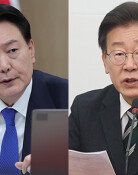Where is Seoul at crossroads of war or dialogue between Washington, Pyongyang?
Where is Seoul at crossroads of war or dialogue between Washington, Pyongyang?
Posted August. 03, 2017 07:27,
Updated August. 03, 2017 08:33
U.S. Secretary of State Rex Tillerson said Tuesday that it is not the United States’ goal to seek a regime change in or conduct a military strike on North Korea. “At some point, they will begin to understand that and that we would like to sit and have a dialogue with them about the future that will give them the security they seek and the future economic prosperity for North Korea,” he said. White House Press Secretary Sarah Sanders told reporters, “If (North Koreans) want to stop their nuclear program, stop the game, stop the missiles, stop the aggression, then I think we may be able to find ways to move forward.” The remarks suggest U.S. intention to seek dialogue with North Korea at a time when calls for hardline measures against the North are surfacing in the wake of Pyongyang’s second intercontinental ballistic missile (ICBM) provocations.
The U.S. officials’ remarks could just be reaffirmations of the Trump administration’s “maximum pressure and engagement” policy of having all options on the table including a military strike and dialogue. However, the remarks attract attention as the Trump administration sent a message to Pyongyang that the door to dialogue remains open despite calls for tough measures against the North.
A series of provocations by North Korea are pushing the United States to a situation in which Washington could no longer be balking. There is an urgent need for the U.S. government to prevent nuclear missiles targeting the U.S. mainland from being deployed. There is not enough time to hang on to North Korea sanctions whose effects are not guaranteed. As were the cases in the first North Korean nuclear crisis in 1994 and the North’s first nuclear test in 2007, Washington and Pyongyang reached a dramatic agreement through dialogue when the crisis was at its crest. The Trump administration might attempt to seek a last-minute deal with Pyongyang to get out of a situation in which the U.S. mainland’s security is threatened. Perhaps, the U.S. government might already be having contacts with Pyongyang through unofficial channels. It is possible that the two sides hold surprise talks on the sidelines of the ASEAN Regional Forum scheduled for August 6 and 7.
However, there are still calls for action rather than dialogue. When the South Korea-U.S. Ulchi Freedom Guardian joint military exercise begins in late August, a confrontational phase is inevitable. Republican Senate Lindsey Graham cited President Trump as saying that he would go to war with North Korea rather than allowing North Korea to develop an ICBM. It is likely that the situation on the Korean Peninsula will be on a roller coaster over the next two to three weeks.
We cannot see where South Korea is in such an urgent game. Whether Washington and Pyongyang have a frontal collision or reach a dramatic agreement, the fallouts could descend entirely upon South Korea. Nevertheless, when asked about a lack of telephone calls between the presidents of South Korea and the U.S., an official of Seoul’s presidential office Cheong Wa Dae asked back how could they have a telephone conversation when they do not have an agenda to discuss. It is worrisome to see Seoul act like a carefree outsider.







